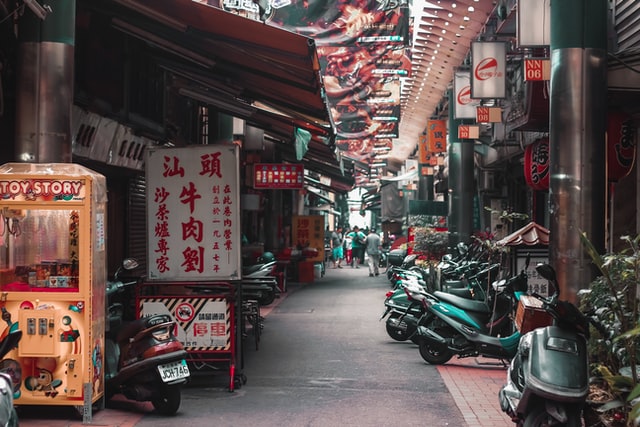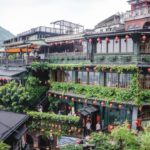On White Privilege in Taiwan

For the past eight months I have been studying Chinese in Taiwan on a nine-month government-funded scholarship. In anticipation of the end of my funding, I have been looking for a job so that I can continue to live here. The process of job-hunting in Taiwan has highlighted for me the privilege with which I have been living as a foreign student, as well as the undeniable advantage I have as a native English speaker seeking a well-paying job, despite my limited work experience.
To tell the truth, I noticed that my scholarship affords me a better-than-average quality of life as soon as I arrived in Taiwan to begin my studies. The scholarship money allows me to live by myself in a studio apartment in the center of Taipei, which in itself is a luxury. In return, I am expected to attend fifteen hours of Chinese languages classes a week and to maintain an eighty percent average on tests and assignments.
This is a fortuitous lifestyle under any circumstances, but when I compare it to that of my language exchange partner (a Taiwanese graduate student at my university who takes up to seven classes a day and has to live in a dormitory, where she shares a single room with three other students) the disparity in opportunities available to me and my Taiwanese peers is obvious.
The man in the video called the Taiwanese woman a whore for dating a foreigner, which is a double standard Taiwanese women face that Taiwanese men don’t when they are making decisions about whom they date.
Job-hunting has proven that I also have advantages in the job market as an English speaker. I have heard some expats complain that the only jobs available to foreigners in Taiwan (besides jobs at overseas branches of companies from their home countries) are English teaching jobs.
While this might be true, the benefits of those English teaching jobs are such that even the most averse-to-teaching expat will bury their qualms in order to reap them. Some of the benefits of working at a private language school–where the only qualification for teaching is a passport from an English-speaking country– include a twenty-hour work week and an hourly pay that is five times higher than the national minimum wage.
On White Privilege in Taiwan
Despite the exploitative nature of English teaching jobs in Taiwan, and despite the many other advantages speaking English affords one abroad, I rarely (if ever) hear English-speaking expats acknowledge the privilege they have here. Instead, the issue of privilege seems to have been overshadowed by complaints of ‘reverse racism’ made by white expats against Taiwanese people.
Many of these complaints stem from a YouTube video that went viral last November, in which a Taiwanese man hurls insults at a Taiwanese woman and her English boyfriend on the Taipei metro.
The Taiwanese man calls the woman a “whore” for dating a foreigner, and her boyfriend a “loser” for “scrounging out an existence in Taiwan,” in a tirade that lasts several minutes. His behavior is unfortunate and condemnable, but it doesn’t prove that Taiwanese people are racist toward white people. Racism exists in Taiwan, but white people–who are viewed as superior throughout Asia, and who are universally eligible for well-paying jobs without having any qualifications or skills–are not its targets.
Despite the exploitative nature of English teaching jobs in Taiwan, and despite the many other advantages speaking English affords one abroad, I rarely (if ever) hear English-speaking expats acknowledge the privilege they have here.
The problem with the complaints of reverse racism in Taiwan (or anywhere) is that they reinforce white privilege by deflecting away from it. Instead of acknowledging the privilege inherent in living abroad as an English-speaking white person in a country that glorifies Western culture, and where the cost of living is low and the salary afforded to English-speakers is high, those expats who complain of reverse racism direct blame for the problem of white privilege onto the very people whom their privilege exploits.
In the case of the YouTube video, the Taiwanese man’s abuse of the Taiwanese woman and her English boyfriend was an extreme reaction to the privilege he perceived the Englishman to have, but his reaction isn’t the root of the problem that white privilege causes.
Refusing to take responsibility for the privilege one has as a white person in Taiwan also reinforces patriarchal values and leads to further exploitation. Amidst the numerous accusations of reverse racism that the YouTube video provoked, it seemed that very little was said about the abuse directed toward the Taiwanese woman.
On White Privilege in Taiwan
The man in the video called her a whore for dating a foreigner, which is a double standard Taiwanese women face that Taiwanese men don’t when they are making decisions about whom they date.
Although a Taiwanese man perpetuated the double standard in this instance, the reality is that foreign men and women are also guilty of doing so. One of the first conversations I had when I arrived in Taiwan was with an American man who joked about how “easy” Taiwanese women are.
This sexist stereotype is doubly reinforced when those in privileged positions not only deny their privilege but also use it to aid the subjection of Taiwanese women.
The question of what to do about white privilege is difficult to answer, but surely starts with acknowledging the privilege you have—if not as a white expat, then as an expat in general.
The question of what to do about white privilege is difficult to answer, but surely starts with acknowledging the privilege you have—if not as a white expat, then as an expat in general. It can be helpful to look at the ways you might expect local people to conform to your own language or beliefs in order to determine steps you can take to diminish entitled behavior.
For expats in Taiwan, things like speaking Chinese as much as possible, acknowledging you aren’t an expert in Cross-Strait relations (even if you wrote a thesis about it), avoiding jobs that are blatantly exploitative, being gracious and open about the high wages you make, and defending local women against sexism from all fronts would all do a lot to diminish the resentment that arises from white privilege.
Acknowledging one’s privilege doesn’t erase it, but doing so would make such a difference in advancing equality throughout the world.
On White Privilege in Taiwan
Related Reading
Throwing Out the Rule Book: Getting Lost in Taiwan
Understanding Taiwanese Identity: A Conversation with Dr. Pei-Ju Mona Wu
Taiwan vs. China: What’s the Difference?
Have you traveled to Taiwan? What were your impressions? Email us at editor@pinkpangea.com for information about sharing your experience and advice with the Pink Pangea community. We can’t wait to hear from you.
Photo credits for On White Privilege in Taiwan by Unsplash.









A bit late to this so I’m not sure if you will see this, but I’m curious if you would be willing to tell me more about the scholarship you got to study Chinese? I’ve been looking into going to Taiwan to study Mandarin but I already graduated from college and don’t want to enroll in another degree program, but I also can’t afford studying without some sort of scholarship or grant. Any info on how you did this would be great!
Also, very great post, super insightful.
It is absolutely not true that whites enjoy privileges here. I have lived in Taiwan (unfortunately) for three years. The color of my skin automatically allocates me to the ESL jobs. There is nothing one can do to break into the extremely closed society here. It is a ridiculous and absurd place to attempt to live. If it weren’t for my wife’s insistence I we would never have settled here in the first place. I knew it would be impossible for me to work in any capacity but English and I am have been right. White privilege! Ha.
Eight months in Taiwan and already an expert who can tell the rest of us foreigners why we don’t really understand our situation here… Whites don’t have privilege in Taiwan. Most whites can never fully integrate in Taiwanese society and gain the benefits the come with developing guanxi with key people and organizations. Many Taiwanese are reasonably friendly with whites, but this typically only extends to surface-level relations and encounters. It’s very difficult, sometimes impossible, for whites to get citizenship in Taiwan (something that hundreds of thousands of Taiwanese have done in the U.S.), and if a white person has serious legal issues, they can get the short end of the stick from the legal system, and face threats of violence from locals crime organizations. Teaching English is a niche opportunity, not some grand proof of privilege. Teaching English can be very draining when you need to constantly entertain children, and buxiban wages aren’t all that great, especially since foreigners can’t save money by living at home like their local counterparts do. If whites truly had privilege in Taiwan then the Taiwanese women who dated white men wouldn’t be so frequently looked down upon, or harassed in the example given. White privilege is a concept developed to explain social/race relations in America, but it doesn’t work in Asia.
Great post, Lane. Well thought out and eloquent. I think what would also be interesting is how easy or difficult it might be for brown people (Indians, for instance) moving to Taiwan to obtain jobs as English teachers. As an Indian (where English is one of the officially associated languages of the government- three is no national language) who has experienced education entirely in English from school to university, I would be interested to know if brown people who have just as much expertise in the language as white people are treated differently when they apply for jobs that require them to teach English, and if brown people are treated differently in situations such as the one you mentioned about the video that went viral- are they thought of as equally threatening, in the racial and patriarchal sense?
Thank you once again.